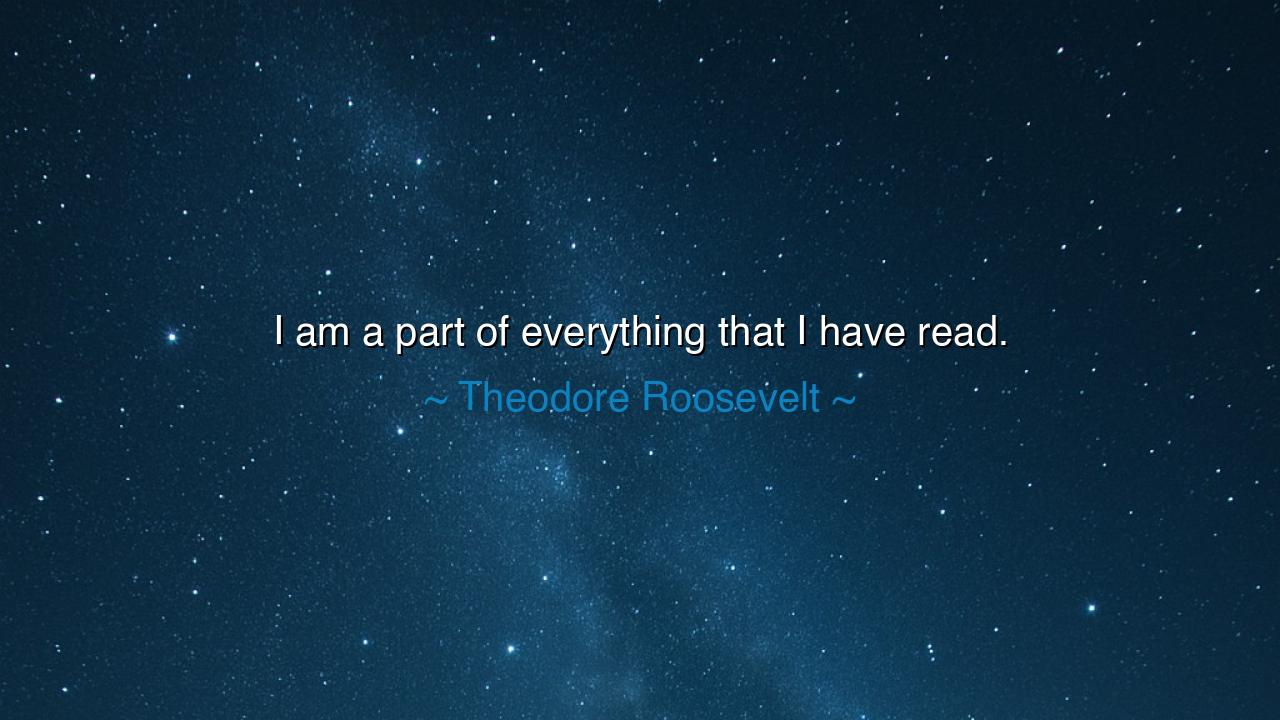
I am a part of everything that I have read.






“I am a part of everything that I have read.” Thus spoke Theodore Roosevelt, warrior, statesman, and lover of books, a man whose life was forged as much in libraries as on battlefields. His words are a confession of the deep truth that reading is not a pastime alone, but a shaping of the soul. Every page absorbed, every story embraced, every idea wrestled with leaves its mark upon the reader, weaving itself into the very fabric of character.
The meaning of this saying is profound. Roosevelt knew that no one stands alone, untouched by what they have consumed. Just as a body is nourished or poisoned by the food it eats, so the mind is enriched or corrupted by the words it takes in. To read is to enter into conversation with the past, to invite voices long silent to speak into your heart. And when those voices speak, they do not leave you unchanged—you become, in part, what they have given. Thus, a reader is never solitary; he carries within himself the wisdom, stories, and visions of countless souls.
Roosevelt himself embodied this truth. Frail and sickly as a boy, he built strength not only with exercise of the body but with discipline of the mind. He devoured books on history, science, philosophy, and adventure. Those readings became his companions, teaching him courage, leadership, and curiosity. When he later charged up San Juan Hill or guided the destiny of a nation, he did not act alone—he acted as one who had drawn upon the lives and lessons of thousands through the pages of books. He was, truly, “a part of everything” he had read.
The ancients also proclaimed this wisdom. Marcus Aurelius, emperor and philosopher, wrote his Meditations as a record of the lessons he had absorbed from teachers and books. His thoughts were not his alone but the echoes of Stoic sages before him. Likewise, Augustine of Hippo confessed that the words of Scripture and philosophy had reshaped his restless heart. In each of these, as in Roosevelt, the truth is plain: a person’s mind is a treasury of all they have encountered, and their character is the sum of those influences.
History provides further testimony in the story of Abraham Lincoln. Born into poverty, with little formal schooling, he taught himself through books. He read the Bible, Shakespeare, and law texts by firelight, and in doing so, he transformed himself from a backwoods boy into one of the greatest leaders of his age. Lincoln, like Roosevelt, was “a part of everything” he had read. His wisdom in guiding a nation torn by war was drawn from the deep well of words that had nourished his mind.
The lesson for us is clear and urgent: guard what you read, and choose well. For every word is a seed, and seeds grow into habits of thought and ways of living. If you fill yourself with shallow things, you will become shallow. If you feed upon lies, you will become crooked. But if you drink deeply from the wells of wisdom, truth, and beauty, then those same qualities will become part of you. Reading is not escape—it is transformation.
So let us remember Roosevelt’s charge: “I am a part of everything that I have read.” Read not idly, but with reverence, for every book you open will leave its imprint on your soul. Read histories to gain perspective, poetry to awaken wonder, philosophy to sharpen thought, and sacred writings to ennoble the spirit. And when you read, do not merely collect knowledge, but let it shape you into something greater. For in the end, what you read is not outside of you—it becomes you. And thus, by choosing your books, you choose who you will become.






AAdministratorAdministrator
Welcome, honored guests. Please leave a comment, we will respond soon